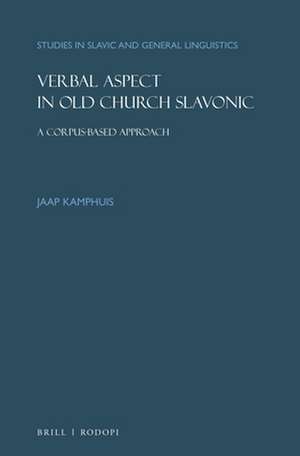Verbal Aspect in Old Church Slavonic: A Corpus-Based Approach: Studies in Slavic and General Linguistics, cartea 45
Autor Jaap Kamphuisen Limba Engleză Hardback – 8 apr 2020
Preț: 674.70 lei
Preț vechi: 822.80 lei
-18% Nou
Puncte Express: 1012
Preț estimativ în valută:
129.10€ • 140.68$ • 108.79£
129.10€ • 140.68$ • 108.79£
Carte indisponibilă temporar
Doresc să fiu notificat când acest titlu va fi disponibil:
Se trimite...
Preluare comenzi: 021 569.72.76
Specificații
ISBN-13: 9789004421592
ISBN-10: 9004421599
Dimensiuni: 155 x 235 mm
Greutate: 0 kg
Editura: Brill
Colecția Brill
Seria Studies in Slavic and General Linguistics
ISBN-10: 9004421599
Dimensiuni: 155 x 235 mm
Greutate: 0 kg
Editura: Brill
Colecția Brill
Seria Studies in Slavic and General Linguistics
Cuprins
Preface
List of Illustrations
1 Old Church Slavonic
1.0 Introduction
1.1 The Moravian Mission
1.2 The Ohrid and Preslav Schools
1.3 What Is OCS?
1.4 The OCS Canon
1.5 Database and Parallel Corpus of OCS Gospel Texts
2 Verbal Aspect
2.0 Introduction
2.1 Lexical Aspect
2.2 Grammatical Aspect
2.3 Verbal Aspect in New Testament Greek
3 Research Questions and Hypotheses
3.0 Research Questions
3.1 Hypotheses and Further Outline of the Study
4 Various Approaches to Determining Aspect in OCS
4.0 Introduction
4.1 Anaspectual Verbs
4.2 Dostál 1954
4.3 Eckhoff & Janda (2014)
4.4 Amse-de Jong (1974)
4.5 Concluding Remarks
5 Morphological Markers of Aspect
5.0 Introduction
5.1 Morphological Markers of Aspect
5.2 Database of OCS Verbs
5.3 Classification of Verbs on Morphological Grounds
5.4 Concluding Remarks
6 The OCS Verbal Paradigm
6.0 Introduction
6.1 The Paradigm of the OCS Verb
6.2 The Time-Relational Model of Tense
6.3 Present Tense
6.4 Aorist and Imperfect
6.5 Imperative
6.6 Present Participles
6.7 Past Participles
6.8 Infinitive and Supine
6.9 Concluding Remarks
7 Grammatical Profile Analysis
7.0 Introduction
7.1 Core Groups
7.2 Inclusion of the Other Groups in the Analysis
7.3 Concluding Remarks
8 The Functions of Verbal Aspect in OCS
8.0 Introduction
8.1 Present Tense
8.2 Aorist and Imperfect
8.3 Anaspectual Verbs
8.4 Some Complicated Cases in the Perfective Group
8.5 Concluding Remarks
9 Semantic Analysis of Non-core Groups
9.0 Introduction
9.1 Prefixed Verbs without Suffixed Partner
9.2 Leskien's Class~II and Partners
9.3 Prefixed Verbs of Motion
9.4 Unprefixed Verbs of Motion
9.5 Derivational Chains with Extra Derived Verbs
9.6 The Verb byti
9.7 Concluding Remarks
10 The Development of Derivational Aspect: a Case Study
10.0 Introduction
10.1 Characteristics of the Selected Verbs
10.2 Semantic Analysis
10.3 Extra Derived Forms
10.4 Case Study Summary
10.5 Derivational Aspect and the Role of the Imperfect
10.6 Concluding Remarks
11 Conclusion
11.0 Research Questions and Hypotheses
11.1 Methodology
11.2 The Functions of Verbal Aspect in OCS
11.3 Origin and Development of Slavic-Style Aspect
11.4 Further Research
Verb Forms Discussed in Examples
References
Index
Notă biografică
Jaap Kamphuis, Ph.D. (Leiden University, 2016), studied Slavic Languages and Cultures at the University of Amsterdam and at Leiden University. He specializes in verbal aspect in Slavic, with an emphasis on Old Church Slavonic and South Slavic.











